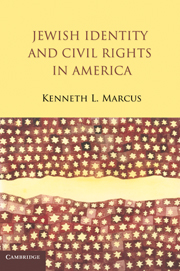Book contents
- Frontmatter
- Contents
- Acknowledgments
- Introduction
- 1 The Dilemma of Jewish Difference
- 2 The Jewish Question in Civil Rights Enforcement
- 3 The New Campus Anti-Semitism
- 4 Criticism
- 5 First Amendment Issues
- 6 Misunderstanding Jews and Jew Hatred
- 7 Institutional Resistance
- 8 The Originalist Approach
- 9 Scientific Theories
- 10 Social Perception
- 11 The Subjective Approach
- 12 Anti-Semitism as Harm to Racial Identity
- Conclusion
- Index
- References
Conclusion
Published online by Cambridge University Press: 05 June 2012
- Frontmatter
- Contents
- Acknowledgments
- Introduction
- 1 The Dilemma of Jewish Difference
- 2 The Jewish Question in Civil Rights Enforcement
- 3 The New Campus Anti-Semitism
- 4 Criticism
- 5 First Amendment Issues
- 6 Misunderstanding Jews and Jew Hatred
- 7 Institutional Resistance
- 8 The Originalist Approach
- 9 Scientific Theories
- 10 Social Perception
- 11 The Subjective Approach
- 12 Anti-Semitism as Harm to Racial Identity
- Conclusion
- Index
- References
Summary
However the issue is framed, Jewish students have powerful claims to the antiracism protections contained in Title VI. That is to say, harassment of Jews is “discrimination because of … race” within the meaning of that law. Despite initial misgivings, the organized Jewish community has now long since recognized that such provisions are important bulwarks against anti-Semitism. The community’s early concerns were not irrational. Some approaches to this question do require Jews to choose between loss of basic rights or adherence to a dubious conceptual framework. It is an awkward choice, and it is understandable that the organized Jewish community was slow to embrace such measures to protect them. The resurgence of anti-Semitism in recent years has generated an equally understandable but opposite reaction. Recently, a Jewish leader in the fight against anti-Semitism participated as a guest in my graduate seminar on anti-Semitism and civil rights policy. Asked how he and his colleagues felt about this question, he responded pragmatically: “We want the protections. The legal arguments that we use to obtain them are secondary.”
From a practitioner’s standpoint, this civil rights advocate probably was right. The conclusion can come first. Currently, the Supreme Court addresses such questions under Shaare Tefila’s “originalist” approach. As we have seen, Jews are unquestionably among the groups protected under Title VI of the Civil Rights Act of 1964 because that measure was devised to enforce rights created under nineteenth-century legislation that (as the Supreme Court has unanimously held) clearly applies to Jews. To the extent that Shaare Tefila provides a complete and correct answer to the Sphinx’s question and is compelled by controlling legal authority, the practitioner really need go no further. If we pursue the issue beyond this answer, it is because there are so many other ways in which the question can be reframed, and some of them are attractive in ways that the originalist approach is not – although each of them has its own downside as well.
- Type
- Chapter
- Information
- Jewish Identity and Civil Rights in America , pp. 188 - 204Publisher: Cambridge University PressPrint publication year: 2010



